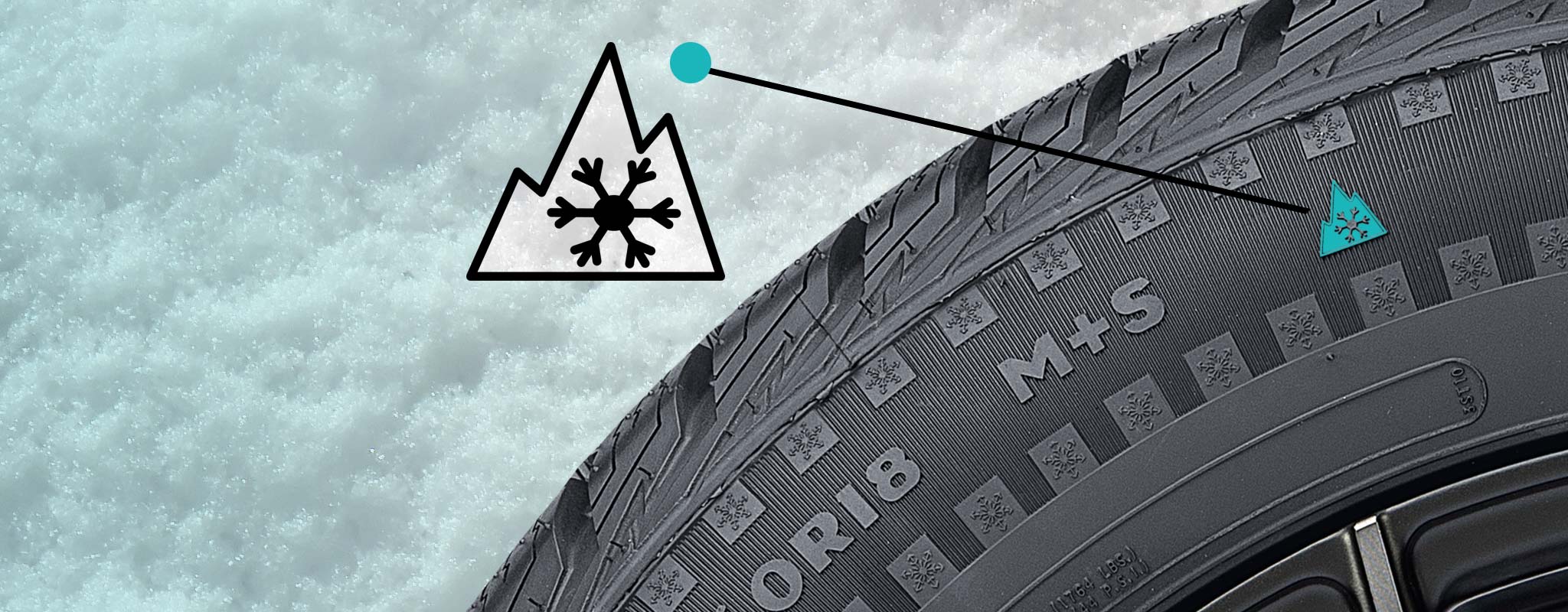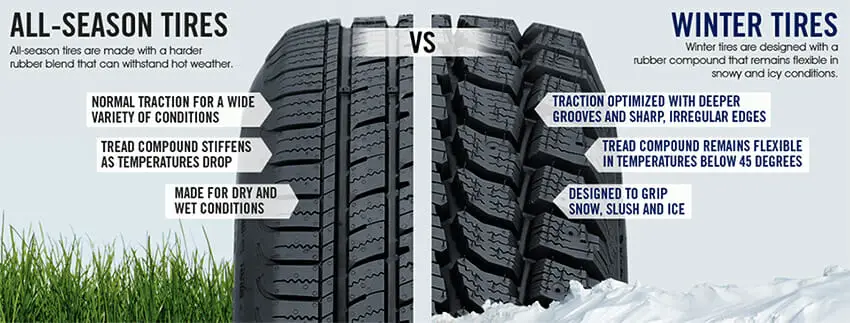How Effective are Snow Tires
When it comes to driving in the snow, are snow tires really worth the investment? Sure, they may give you a little extra traction, but is it enough to make a difference when roads are icy and conditions are treacherous?There’s no doubt that snow tires can give you an advantage when it comes to driving in winter conditions.
But whether or not they’re worth the money is another question altogether. Let’s take a closer look at how effective snow tires really are.
What you need to know about winter tires
Are you thinking about getting snow tires for your car? You might be wondering how effective they really are.Snow tires are designed to provide better traction in icy and snowy conditions.
They have a deeper tread than regular tires, which helps them grip the road better. They also have special rubber compounds that remain flexible in cold weather, so they can maintain their grip even when the temperature drops.So, how effective are snow tires?
They can definitely make a difference when driving in winter weather conditions. If you live in an area where it snows regularly, or if you plan on doing any driving in snowy or icy conditions, snow tires are worth considering.
Are Snow Tires Worth It Reddit
Are Snow Tires Worth It? RedditIf you live in an area that gets a lot of snow, then you’ve probably wondered if snow tires are worth the investment.
After all, they can be expensive, and it’s not always clear if they’re actually going to make a difference in your driving.So, what do people on Reddit think? Well, it seems like most people who have tried snow tires would recommend them.
They say that they make a big difference in how your car handles in the snow and ice, and that they give you a lot more confidence when driving in winter conditions.Of course, there are some downsides to snow tires. For one thing, they can be expensive – sometimes upwards of $1000 for a set.
They also tend to wear down quickly if you use them on dry roads, so you’ll need to factor that into the cost as well.Overall, though, it seems like snow tires are worth it for most people – especially if you live in an area where winters are long and harsh. So if you’re on the fence about whether or not to get them, take some advice fromRedditors and give them a try!
Snow Tires Vs Chains
When it comes to driving in snowy or icy conditions, there are a few different options available to help give your car traction. Two of the most popular options are snow tires and chains. But which one is better?
There are pros and cons to both snow tires and chains. Snow tires provide better traction than regular tires because they have a deeper tread depth and more gripping power. They also work well on icy roads.
However, they can be more expensive than regular tires and they don’t last as long. Chains, on the other hand, are less expensive but they can be more difficult to put on and take off. They also don’t provide as much grip as snow tires do.
So, which should you use? It really depends on your budget and what type of roads you’ll be driving on. If you’re mainly driving on cleared streets with occasional ice or snow, then regular tires should be fine.
But if you’re going to be driving in deep snow or on unpaved roads, then snow tires or chains would be a better option.
Snow Tires Vs All-Season
When the snow starts to fly, it’s time to think about whether you want to put snow tires on your car or not. Snow tires can provide better traction and control in winter weather conditions, but they come at a cost. All-season tires are less expensive and may be adequate for light snowfall in some cases.
But if you live in an area with heavy snowfall, you’ll probably be better off with snow tires. Here’s a look at the pros and cons of each option to help you decide what’s best for your situation.Snow Tires
Pros:1. Better traction and control on icy or snowy roads.2. Can improve fuel economy by reducing rolling resistance.
3. Longer lifespan than all-season tires due to softer rubber compound that wears down less quickly in winter conditions.
Do Winter Tires Make a Difference in Fwd
When it comes to FWD vehicles, many people swear by winter tires. Winter tires provide extra traction and grip on icy and snowy roads, which can make a big difference in safety. Some people even say that they feel more confident driving on winter tires.
While all-season tires are fine for most driving conditions, they don’t offer the same level of traction and grip as winter tires. If you live in an area with lots of snow and ice, or if you plan on doing any driving in winter conditions, it’s definitely worth considering getting a set of winter tires.
Are Winter Tires Good in Summer
Most people think that winter tires are only good for, well, winter. But did you know that winter tires can actually be a great option for driving in summer too?Here’s why: Winter tires are made from a different type of rubber compound than regular tires.
This compound is designed to stay softer and pliable in cold weather, which helps the tire maintain better grip on icy or snow-covered roads.But this same softness also makes winter tires ideal for warm weather driving. The softer rubber helps the tire grip the road better, which can improve handling and braking performance.
And since there’s less chance of slipping and sliding around on slick roads, you may find that you feel safer behind the wheel when using winter tires in summer.Of course, there are a few things to keep in mind if you decide to use winter tires year-round. First, they will wear down faster than regular tires – so you’ll need to keep an eye on tread depth and replace them more frequently.
Second, they may not perform as well on very hot days (over 90 degrees Fahrenheit) since the softer rubber can start to break down at high temperatures.So if you live in an area with mild winters and hot summers, using winter tires all year long could be a great way to improve your safety and performance on the road. Just be sure to keep an eye on tread wear and don’t use them on extremely hot days!

Credit: www.lesschwab.com
What are the Cons of Snow Tires?
There are a few potential drawbacks to using snow tires, even though they can be beneficial in many situations. One of the main cons is that they can decrease fuel economy. This is because the softer rubber compound used in snow tires is less efficient at rolling than regular tires.
As a result, your engine has to work harder to move the vehicle, which uses more fuel. Another drawback is that snow tires can wear down faster than regular tires. This is especially true if you use them on dry pavement, where they will tend to skid and slip more than usual.
Finally, snow tires can be more expensive than regular tires, so there’s an initial investment required to switch over.
Can Snow Tires Stop on Ice?
While regular tires are made to grip the road, snow tires are designed for traction in slippery conditions like snow and ice. They’re made with a softer rubber compound that stays pliable in cold weather and has deeper treads for better traction.So, can snow tires stop on ice?
Yes, they can. In fact, they often outperform regular tires in icy conditions. The key is to make sure your tires are properly inflated and have adequate tread depth for the conditions you’ll be driving in.
How Fast Can You Drive on Snow Tires?
While it is never recommended to drive at high speeds in winter weather, your speed will be limited by how fast you can drive on snow tires. The best way to determine this is to consult your vehicle’s owner manual or the tire manufacturer.In general, however, you can expect that snow tires will have a lower speed rating than all-season or summer tires.
This is because snow tires are made with a different compound than other tires and have deeper treads to provide better traction in slippery conditions.So while you may be able to safely drive faster on all-season or summer tires in ideal road conditions, it is not advisable to do so on snow tires. Play it safe and stick to the posted speed limits (or slower) when driving on snow-covered roads.
Are Snow Tires As Good As All Wheel Drive?
If you live in an area that gets a lot of snow, you’ve probably wondered if snow tires are really as good as all wheel drive. The answer is: it depends.On the one hand, all wheel drive provides better traction and stability in slippery conditions.
It’s also more effective at climbing hills and accelerating from a stop. So, if you do a lot of driving in snowy or icy conditions, all wheel drive may be the way to go.On the other hand, snow tires provide better grip and traction than all wheel drive in most situations.
They’re also more maneuverable, so if you find yourself doing a lot of driving in tight spaces (like parking lots), snow tires may be the better option.Ultimately, the best way to decide which is right for you is to test them both out in different conditions and see which feels best to you.
Conclusion
If you live in an area where it snows, you’ve probably wondered if snow tires are worth the investment. After all, they can be expensive, and your regular tires seem to do fine most of the time. But is that really the case?
Here’s a look at how effective snow tires are and whether or not they’re worth the money.To start with, it’s important to understand that snow tires are designed specifically for cold weather and icy conditions. They’re made from a different type of rubber compound that remains flexible in freezing temperatures.
This helps them grip the road better than regular tires.They also have deeper treads than regular tires, which helps them channel away water and slush so they maintain contact with the road surface. This is especially important on slick roads where even a small loss of traction can cause you to lose control of your vehicle.
So, how effective are snow tires? They can make a big difference on slippery roads, giving you better traction and more confidence behind the wheel. If you live in an area where winter driving conditions are common, they’re definitely worth considering.


